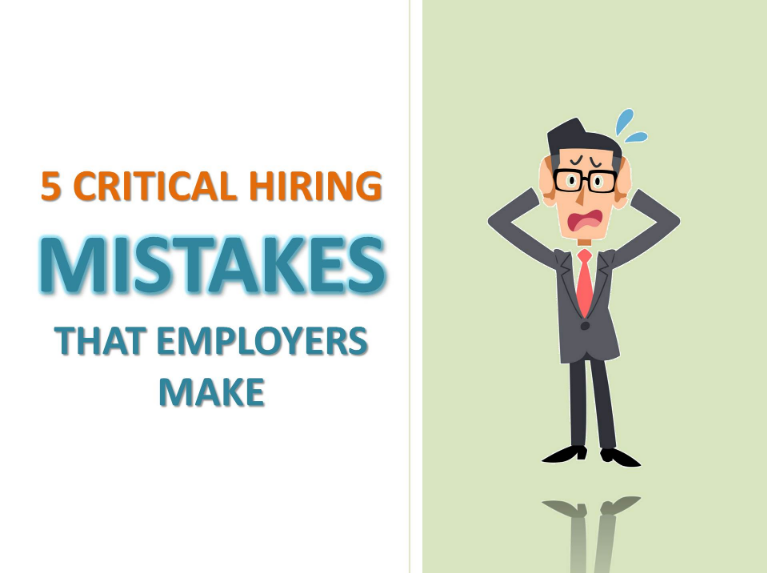5 Biggest Mistake When Recruiting Employers

5 Critical Hiring mistakes that Employers make
A lot of big and small organisations are hiring throughout the year for one or more positions due to attrition or expansion, etc. It is thus evident that along with the core operations of an organisation hiring also is carried out as a regular process. So, if we go wrong at hiring a candidate and retaining him in the organisation then the entire cost and time spent through the process is frittered away. To be sure of using the right recruitment strategy an organisation needs to realise the importance of considering a few simple but extremely critical aspects of hiring. Employers who wish to perk up their hiring may read through the following mistakes that are to be avoided:
Not updating your hiring procedure
Most of the organisations make the mistake of following the same old hiring procedure that they have been using for years. Times change, markets change, prospective candidates change, job requirements also change but if the hiring procedure doesn’t change then you will definitely not be able to get the best fit for that job. There should be a proper hiring process flowchart prepared and each step should be defined thoroughly. A hiring checklist should be prepared to keep a close eye on the hiring process as per the hiring process flowchart. This procedure should be upgraded regularly with every cycle of recruitment. An updated hiring procedure ensures that the right candidate is hired for the right job posting.
Not stating clear and detailed job description
Generally organisations rush into the hiring process without letting the recruiter know about the actual job responsibilities that are expected out of the new hire. Till you are not sure what kind of a person you want for the job you will never be able to make the right choice. Therefore, it is a blunder to announce a hiring requirement without understanding the prerequisites of a position. Hence, whenever you are planning to hiring, it is extremely important to first understand what kind of qualifications and skills you require to fill that job posting, what kind of a personality that person should possess to adjust well with the work environment and the organisational culture. The hiring criteria play a very important role in quantifying and objectifying the entire hiring procedure.
Speeding up the hiring process
We are mostly in a lot of hurry bearing in mind the IOT age, we want everything to be done in a few seconds and days together is a long period. So we don’t want to waste any time and money in delaying the hiring procedure and onboarding process for an opening that we announce. This ends up in checking out and screening just a few people in a short time. We are then left with a very narrow choice which may still not be the best one. We are still reluctant to go through some more profiles where we might come across a better prospect as we fear loss of more time and resources. But we fail to understand that it is a crucial stage of conducting a hiring process, recruiting a candidate and onboarding him and a small mistake can result in investing double the cost of hiring, when the new hire either fails to deliver or moves out due to misfit and frustration. Hence, the hiring process timeline should neither be too long nor too short so as to give you enough time to screen the best possible profiles that you come across.
Taking the interview unprepared
We are usually of the view that preparing for the interview is the responsibility of the candidate and not of the recruiter as it is his requirement to get a job. But we need to understand that both of us, the recruiter as well as the candidate are sitting there for a win-win bargain. Hence, preparing for the interview is as important for the recruiter as for the candidate. Reviewing each candidate’s resume gives us highlights of what kinds of interview questions can be asked at the time of interaction to properly understand the candidature for the profile. It also gives us time to prepare for questions that the candidate may have for us to understand the profile and the work nature, etc., clearly. This will let us utilise the time of the interview by giving us access to strategic interview questions to make the best use of it in understanding the candidate. This may also impress the candidate and make him feel important for the organisation.
Improper on boarding and orientation
Most of the times, we operate without a new hire checklist and we put the candidate to work without even officially completing the new hire orientation process. We do not want to delay the knowledge transfer, etc., especially when the position has been vacant for long and hence expect the candidate to just start off. However, this doesn’t let the candidate adjust to the environment and take time to understand the operations and processes well. Quite a few organisations do not even formulate an onboarding checklist and hence are incapable of fulfilling all the onboarding documentation that is required from the candidate. This may result in absorbing a candidate who may not be fulfilling the hiring criteria officially and legally and we may even require terminating the employment in future.


